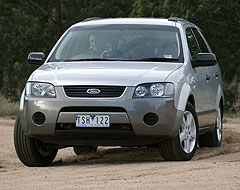Make / Model Search
News - General News - SafetyCanberra makes ESC mandatoryPolitical control: Life-saving ESC will be mandatory on all new cars under federal law, heading off state-by-state legislation. Industry welcomes legislation requiring all new cars to be fitted with ESC by 201323 Jun 2009 ELECTRONIC stability control (ESC) will be mandatory on all new-model passenger vehicles introduced from November 2011. From November 2013, all new passenger vehicles sold in Australia regardless of when they were introduced will be required to be fitted with the proven life-saving technology. However, some road safety campaigners are disturbed that light commercial vehicles such as the top-selling Toyota HiLux are not covered by the new legislation. Legislation mandating ESC had been expected by the industry for a year, but details were only yesterday (Tuesday) confirmed when it was signed into law by federal transport minister Anthony Albanese. “The new regulations mandating ESC brings Australia into line with international standards,” said Mr Albanese in a statement. “In fact, we are fully phasing in ESC one year ahead of Europe. “Research both here and overseas has found this innovative technology has the potential to save lives and make our roads significantly safer. Research undertaken for the British government found vehicles equipped with ESC are 25 per cent less likely to be involved in a fatal accident than those without it.” Two-thirds of all new cars and SUVs sold in Australia are already fitted with ESC, according to the Federal Chamber of Automotive Industries. This is up from about 20 per cent in June 2006.  ESC is a computer-based system that helps drivers maintain control of their vehicles, particularly in adverse conditions such as wet weather. It continuously monitors a vehicle’s speed, steering wheel angle, direction of travel and cornering acceleration, automatically applying individual brakes if there is a risk of skidding. ESC is a computer-based system that helps drivers maintain control of their vehicles, particularly in adverse conditions such as wet weather. It continuously monitors a vehicle’s speed, steering wheel angle, direction of travel and cornering acceleration, automatically applying individual brakes if there is a risk of skidding.Speaking at the announcement in Canberra, FCAI president Mark Reuss, who is also the chairman and managing director of GM-Holden, praised the government for introducing a standardised national approach to vehicle safety rather than allowing a state by state rollout to occur. “Mainstreaming ESC technology in passenger cars and SUVs will save lives – it is as simple as that,” said Mr Reuss. “ESC greatly improves vehicle safety performance and is probably the most significant advance in vehicle safety since seatbelts were made compulsory in the early 1970s. “ESC is all about avoiding crashes – fitting ESC as standard is absolutely the right thing to do for all motorists.” Mr Reuss said that Holden was already committed to fitting ESC to every next-generation Holden, including its Colorado and Commodore Ute light commercial vehicles. It is already standard on 80 per cent of all Holdens sold this year. FCAI chief executive Andrew McKellar said the industry supported the government legislation and already offered ESC on most models. “Manufacturers and motorists have moved quickly to embrace this lifesaving technology, and by the end of the year it is likely to be fitted to more than seven out of 10 new vehicles,” he said. “ESC offers significant safety benefits and the industry has worked cooperatively with the federal government to ensure that this technology becomes available on all new vehicles as soon as possible.” Further support for the new legislation came from the Australasian New Car Assessment Program (ANCAP), which has been promoting mandatory ESC for a couple of years. “This is good news for Australian motorists and their families,” said ANCAP chairman Lauchlan McIntosh. “It will cut crashes, save lives and reduce the tremendous social and personal cost of road trauma. “Since 2008 ANCAP’s crash testing program stipulates any new vehicle needs ESC to gain a top five-star rating. “Research overseas and here in Australia at the Monash University Accident Research Centre shows clearly that ESC does make a difference and can reduce some types of crashes by some 25 per cent or more. “Given road trauma costs Australia around $17 billion a year, the faster uptake of ESC will obviously mean great savings for the Australian economy and the community.” Read more:FCAI attacks state safety pushStandard stability closer |
Click to shareGeneral News articlesResearch General News Motor industry news |









Facebook Twitter Instagram